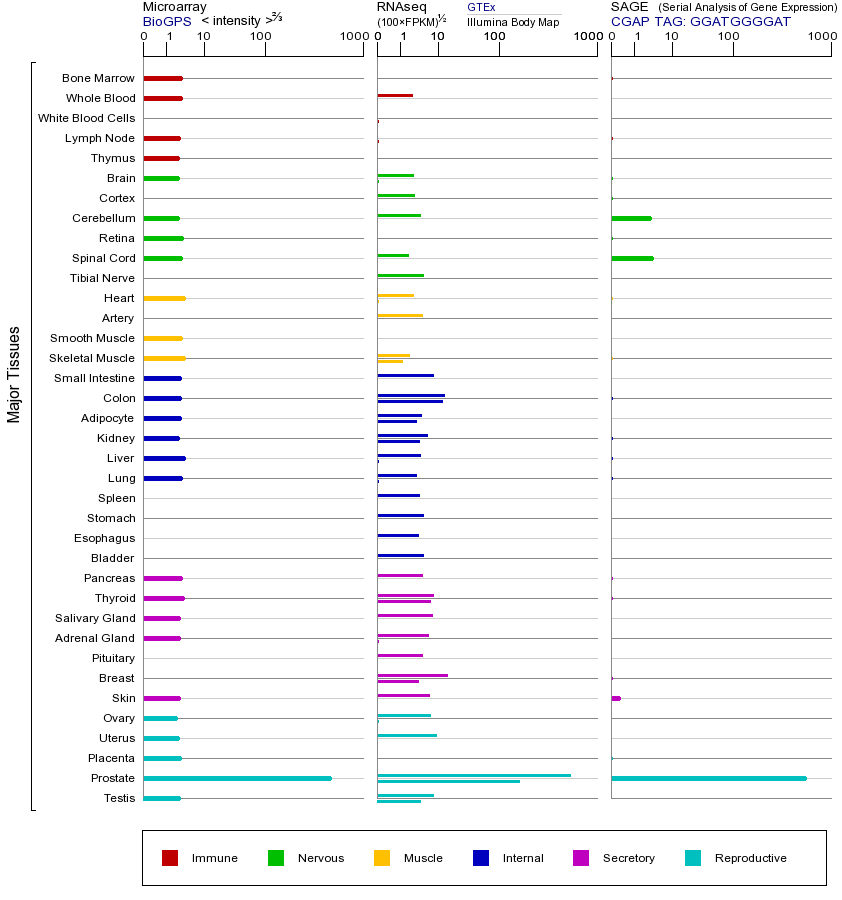KLK3 (kallikrein related peptidase 3)
- symbol:
- KLK3
- locus group:
- protein-coding gene
- location:
- 19q13.33
- gene_family:
- Kallikreins
- alias symbol:
- PSA
- alias name:
- prostate specific antigen
- entrez id:
- 354
- ensembl gene id:
- ENSG00000142515
- ucsc gene id:
- uc021uyi.2
- refseq accession:
- NM_145864
- hgnc_id:
- HGNC:6364
- approved reserved:
- 2001-06-22
KLK3(激肽释放酶相关肽酶3),也称为前列腺特异性抗原(PSA),是一种由前列腺上皮细胞分泌的丝氨酸蛋白酶,属于激肽释放酶(KLK)基因家族。KLK家族包含15个成员(KLK1-KLK15),它们编码的蛋白大多具有蛋白酶活性,参与多种生理过程,如精液液化、皮肤脱屑、炎症反应和激素调节。KLK3的主要功能是分解精液中的精囊凝固蛋白(如semenogelin),促进精液液化以释放精子,这对男性生育能力至关重要。KLK3的表达受雄激素受体(AR)调控,因此其水平在男性血液中可作为前列腺功能的生物标志物。KLK3的突变较为罕见,但某些单核苷酸多态性(SNP)可能影响其表达水平或蛋白活性,与前列腺疾病风险相关。KLK3的过表达通常与前列腺疾病相关,尤其是前列腺癌,此时血液中PSA水平显著升高,因此PSA检测被广泛用于前列腺癌筛查。然而,PSA水平升高也可能由良性前列腺增生(BPH)或前列腺炎引起,导致假阳性结果。相反,KLK3表达降低可能影响精液液化,导致男性不育,但这种情况较少见。在前列腺癌中,KLK3不仅作为诊断标志物,其蛋白产物还可能通过激活生长因子(如IGF-1)或降解细胞外基质来促进肿瘤进展。此外,KLK家族成员间存在功能冗余,例如KLK2与KLK3具有相似的底物特异性,可能部分补偿KLK3的功能缺失。KLK3与其他KLK成员(如KLK4、KLK14)在前列腺癌中常共表达,形成蛋白酶级联反应,参与肿瘤微环境调控。研究还发现KLK3可能与阿尔茨海默病相关,因其可降解β-淀粉样蛋白,但具体机制尚不明确。总体而言,KLK3是KLK家族中研究最深入的成员,其临床价值主要体现在前列腺疾病诊断中,但过度依赖PSA筛查也存在争议,需结合其他指标提高准确性。
Kallikreins are a subgroup of serine proteases having diverse physiological functions. Growing evidence suggests that many kallikreins are implicated in carcinogenesis and some have potential as novel cancer and other disease biomarkers. This gene is one of the fifteen kallikrein subfamily members located in a cluster on chromosome 19. Its protein product is a protease present in seminal plasma. It is thought to function normally in the liquefaction of seminal coagulum, presumably by hydrolysis of the high molecular mass seminal vesicle protein. Serum level of this protein, called PSA in the clinical setting, is useful in the diagnosis and monitoring of prostatic carcinoma. Alternate splicing of this gene generates several transcript variants encoding different isoforms. [provided by RefSeq, Jul 2008]
激肽释放酶是具有多种生理功能的丝氨酸蛋白酶的一个亚组。越来越多的证据表明,许多激肽释放酶在肿瘤发生牵连,部分为新的癌症和其他疾病的生物标志物的潜力。这个基因是位于集群染色体19上其蛋白产物是一个存在于精浆蛋白酶十五激肽释放酶亚家族成员之一。它被认为可能是通过将高分子量精囊蛋白水解精浆凝结物的液化正常工作。这种蛋白质,称为PSA在临床上的血清水平,是在前列腺癌的诊断和监测是有用的。该基因的可变剪接产生编码不同亚型的几个抄本变形。 [由RefSeq的,2008年7月提供]
基因本体信息
KLK3基因(以及对应的蛋白质)的细胞分布位置:
- 质膜
- 细胞质
- 细胞外
- 高尔基体
- 囊泡
- 细胞骨架
- 内质网
- 细胞核
- 内体
- 溶酶体
- 线粒体
KLK3基因的本体(GO)信息:
| 名称 |
|---|
| 5200 Pathways in cancer [PATH:hsa05200] |
| 5215 Prostate cancer [PATH:hsa05215] |
| 名称 |
|---|
| Activated PKN1 stimulates transcription of AR (androgen receptor) regulated genes KLK2 and KLK3 |
| Metabolism of proteins |
| Regulation of Insulin-like Growth Factor (IGF) transport and uptake by Insulin-like Growth Factor Binding Proteins (IGFBPs) |
| RHO GTPase Effectors |
| RHO GTPases activate PKNs |
| Signal Transduction |
| Signaling by Rho GTPases |
| 疾病名称 | 关系值 | NofPmids | NofSnps | 来源 |
| Malignant neoplasm of prostate | 0.261542831 | 781 | 17 | BeFree_GAD_GWASCAT |
| Prostatic Neoplasms | 0.21287732 | 75 | 1 | BeFree_CTD_human_GAD_LHGDN |
| Prostatic Hyperplasia | 0.130540083 | 5 | 0 | CTD_human_GAD_LHGDN |
| Disease Progression | 0.12 | 1 | 0 | CTD_human |
| Neoplasm Recurrence, Local | 0.12 | 1 | 0 | CTD_human |
| Malignant Phyllodes Tumor of Prostate | 0.12 | 1 | 0 | CTD_human |
| Prostate carcinoma | 0.08 | 776 | 17 | BeFree |
| Neoplasm Metastasis | 0.021367963 | 71 | 3 | BeFree_GAD |
| Mammary Neoplasms | 0.014426145 | 17 | 0 | BeFree_LHGDN |
| Benign Prostatic Hyperplasia | 0.014386419 | 53 | 1 | BeFree |
联系方式
山东省济南市章丘区文博路2号 齐鲁师范学院 genelibs生信实验室
山东省济南市高新区舜华路750号大学科技园北区F座4单元2楼
电话: 0531-88819269
E-mail: product@genelibs.com
微信公众号
关注微信订阅号,实时查看信息,关注医学生物学动态。







